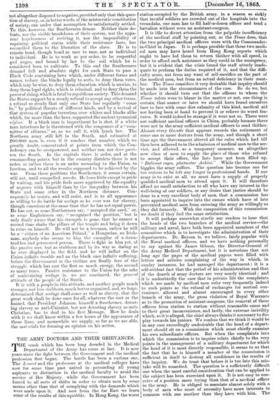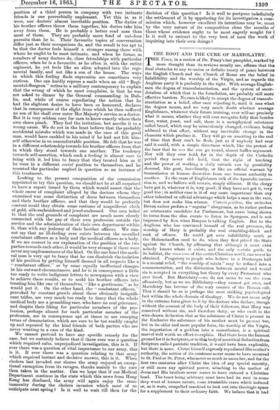THE ARMY DOCTORS AND THEIR G-RIEVANCES.
THE crash which has been long dreaded in the Medical Department of the Army has come at last. It is now years since the fight between the Government and the medical profession first began. The battle has been a curious one. The Lancet and the professors at the medical colleges have now for some time past united in persuading all young aspirants to distinction in the medical faculty to avoid the service of Her Majesty, while the Government has been forced to all sorts of shifts in order to obtain men by some means other than that of complying with the demands which were made upon it. And now from the far East we learn some of the results of this squabble. In Hong Kong, the worst
station occupied by the British army, in a season so sickly that invalid soldiers are crowded out of the hospitals into the verandahs, one man has to fill half-a-dozen offices and tend a battalion without even an assistant-surgeon.
It is idle to divert attention from the palpable insufficiency of the medical staff by pointing out, as the Times does, that the two principal medical officers were with the Commander- in-Chief in Japan. It is perhaps possible that these two medi- cal men may have heard from Hong Kong reports which ought to have led them to return thither with all speed, in order to afford Rich assistance as they could in the emergency, but it is evident that the crisis found the staff utterly inade- quate to perform the duties required of it, and that the diffi- culty arose, not from any want of self-sacrifice on the part of the medical men, but from an actual deficiency in their num- ber. The Tintes considers it very desirable that inquiry should be made into the circumstances of the case. 'So do we, but whether it should turn out that the officers to ' whom the Times refers were to blame in the matter or not one thing is certain, that sooner or later we should have found ourselves face to face with some dire calamity of this kind, medical aid not having been at hand to prevent it or relieve its worst fea- tures. It would indeed be strange if it were not so. There were not sufficient medical officers in China, probably because there were not in the army sufficient medical officers to send thither. Almost every Gazette that appears records the retirement of some one or more doctors from the army, and though a short time ago the Government altered all the rules which, had till then been adhered, to in the admission of medical men to the ser- vice, and allowed, as a temporary measure, an altogether new class of men to supply the place of those who refused to accept their offers, the lists have not been filled up. " Delirant reges, plectuntur Ac/in." While the Government higgles the army suffers. The question has become one far too serious to be left any longer in professional hands. If our army is to exist at all, we must have a supply of properly qualified medical men to attend upon it. It will therefore afford no small satisfaction to all who have any interest in the well-being of our soldiers, or any desire that justice should be done to a very excellent body of men, that a commission has been appointed to inquire into the causes which have of late prevented medical men from entering the army as willingly as they did formerly. With the composition of this commission we doubt if they feel the same satisfaction.
It will perhaps somewhat startle our readers to hear that the heads of the two branches of the medical service—the military and naval, have both been appointed members of -the committee which is to investigate the administration of their departments. Dr. Bryson is, we believe, fairly popular with the Naval medical officers, and we have nothing personally to say against Sir James Gibson, the Director-General of the Army Medical Department, but it is notorious that not lone ago the pages of the medical papers were filled with letters and articles complaining of the way in which, in sundry instances, he had managed the department ; it is a self-evident fact that the period of his administration and that of the dearth of army doctors are very nearly identical ; and it is undoubtedly the case that in private life the complaints which are made by medical men refer very frequently indeed to such points as the refusal of exchanges for mutual con- venience, allowed and almost encouraged in every other branch of the army, the gross violation of Royal Warrants as to the promotion of assistant-surgeons, the removal of these officers from station to station without reasonable cause and to their great inconvenience, and lastly, the extreme incivility which, as it is alleged, the chief always thinks it necessary to dis- play towards his juniors. We confess that we think it would be in any case exceedingly undesirable that the head of a depart- ment should sit on a commission which must chiefly examine his own subordinate officers. But when the complaints into which the commission is to inquire relate chiefly to the very points in the management of a military department for which the head of it is most directly responsible, it seems to us that the fact that he is himself a member of the commission is sufficient in itself to destroy all confidence in the results of the inquiry. We do trust that before it is too late this mis- take will be remedied. The question is a sufficiently difficult one when the most careful consideration that can be applied to the subject has been exercised upon it. It is not easy to con- ceive of a position more trying than that of a medical officer in the army. He is obliged to associate almost solely with a body of men who must of necessity have more interests in common with one another than they have with him. The
position of a third person in company with two intimate friends is one proverbially unpleasant. Yet this is, as it were, our doctors' almost inevitable position. The duties of his brother officers throw them together, his duties take him away from them. He is probably a better read man than most of them. They are probably more fond of out-door pursuits than he is. Their favourite topics of conversation differ just as their occupations do, and the result is too apt to be that the doctor feels himself a stranger among those with whom he ought to be most intimate, and when he forms, as numbers of army doctors do, close friendships with particular officers, when he is a favourite, as he often is, with the entire regiment, he yet feels like an alien adopted into the regi- mental family, and not like a son of the house. The ways in which this feeling finds expression are sometimes very curious. One can hardly repress a smile when an old " Regi- mental-Surgeon " writes to a military contemporary to explain that the wrong of which he most complains, is that he was not asked to dinner by the General commanding in Dub- lin, and, while of course repudiating the notion that he had the slightest desire to have been so honoured, declares that in consequence of the slight from which he then suffered no son of his shall ever enter Her Majesty's service as a doctor. But it is very seldom easy for men to know exactly where their own shoes pinch. They feel the irritation, but ascribe it to a wrong cause. We do not in the least believe that the probably accidental mistake which was made in the case of this good man, would have rankled in his mind if he had not felt him- self otherwise in an uncomfortable position. He felt that he was in a different relationship towards his brother officers from that in which they stood towards one another. The tendency towards self-assertion, which such a feeling is almost sure to bring with it, led him to fancy that they treated him as if he were in a different social position to themselves, and he resented the particular neglect in question as an instance of this treatment.
Looking to the present composition of the commission appointed to try this question, we should not be at all surprised to have a report issued by them which would assert that the whole cause of complaint alleged by the doctors whom they examined was some distinction of dress between themselves and their brother officers, and that they would be perfectly content could they obtain some costume of magnificent cloth of gold, silk-embroidered and jewel-embossed. Our own belief is, that the real grounds of complaint are much more closely connected with the pay of their own profession outside the service and the administration of their own department within it, than with any jealousy of their brother officers. We can- not say that no ill-feeling ever exists between the so-called combatant officers as a body and the medical officers as a body. If we are correct in our explanation of the position of the two parties towards each other, it would be very strange if there were never any unpleasantness of the kind. On the one hand the medi- cal man is very apt to fancy that he can diminish the isolation of his position by getting himself dressed in all respects like a "combatant officer, or by some equally ineffectual changes in his outward circumstances, and he is in consequence a little too ready to write indignant letters to newspapers with a view to achieve these results, or to scold his brother officers into treating him like one of themselves, "like a gentleman," as he would put it. On the other hand, the "combatant officers," provoked by constant growls about these obviously insignifi- cant trifles, are very much too ready to fancy that the whole medical body are a grumbling race, who have no real grievance, and despite their liking for particular members of the pro- fession, perhaps almost for each particular member of the profession, are in consequence apt at times to use sweeping terms of denunciation, which are sure to be too readily caught up and repeated by the kind friends of both parties who are never wanting in a case of the kind.
We cannot pretend to have any specific remedy for the case, but we certainly believe that if there ever was a question which required calm, unprejudiced investigation, this is it. If ever there was a question of vital importance to our army, this is it. If ever there was a question relating to that army which required instant and decisive answer, this is it. When cholera last invaded our shores the army enjoyed an excep- tional exemption from its ravages, thanks mainly to the care then taken in the matter. Can we hope that if our Medical Department continue in the state which this news from Hong Kong has disclosed, the army will again enjoy the same immunity during the cholera invasion which most of us anticipate next spring ? Is it well to wait till then for the decision of this question Is it well to postpone indefinitely the settlement of it by appointing for its investigation a com- mission which, however excellent its intentions may be, must by the very nature of its composition close the mouths of those whose evidence ought to be most eagerly sought for Is it well to entrust to the very best of men the work of inquiring into their own doings



































 Previous page
Previous page